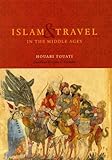Islam and travel in the Middle Ages / Houari Touati ; translated by Lydia G. Cochrane.
Material type: TextLanguage: English Original language: French Publisher: Chicago ; London : The University of Chicago Press, 2010Description: ix, 305 pages : maps ; 24 cmContent type: text Media type: unmediated Carrier type: volumeISBN: 9780226808772; 0226808777Uniform titles: Islam et voyage au Moyen Âge. English Subject(s): Travel -- Religious aspects -- Islam | Muslim travelers -- History -- To 1500 | Muslim pilgrims and pilgrimages | Emigration and immigration -- Religious aspects -- Islam | Travelers' writings, Arabic -- Islamic Empire -- History and criticism | Travel, Medieval | Emigration and immigration -- Religious aspects -- Islam | Muslim pilgrims and pilgrimages | Muslim travelers | Travel, Medieval | Travel -- Religious aspects -- Islam | Travelers' writings, Arabic | Islamic Empire | Reise | Wallfahrt | Islam | Reisender | Muslim | To 1500Genre/Form: Criticism, interpretation, etc. | History.DDC classification: 910.4 LOC classification: BP190.5.T73 | T681 2010
TextLanguage: English Original language: French Publisher: Chicago ; London : The University of Chicago Press, 2010Description: ix, 305 pages : maps ; 24 cmContent type: text Media type: unmediated Carrier type: volumeISBN: 9780226808772; 0226808777Uniform titles: Islam et voyage au Moyen Âge. English Subject(s): Travel -- Religious aspects -- Islam | Muslim travelers -- History -- To 1500 | Muslim pilgrims and pilgrimages | Emigration and immigration -- Religious aspects -- Islam | Travelers' writings, Arabic -- Islamic Empire -- History and criticism | Travel, Medieval | Emigration and immigration -- Religious aspects -- Islam | Muslim pilgrims and pilgrimages | Muslim travelers | Travel, Medieval | Travel -- Religious aspects -- Islam | Travelers' writings, Arabic | Islamic Empire | Reise | Wallfahrt | Islam | Reisender | Muslim | To 1500Genre/Form: Criticism, interpretation, etc. | History.DDC classification: 910.4 LOC classification: BP190.5.T73 | T681 2010| Item type | Current library | Call number | Copy number | Status | Notes | Date due | Barcode |
|---|---|---|---|---|---|---|---|
 Books
Books
|
Female Library | BP190.5.T73 .T681 2010 (Browse shelf (Opens below)) | 1 | Available | STACKS | 51952000320265 | |
 Books
Books
|
Female Library | BP190.5.T73 .T681 2010 (Browse shelf (Opens below)) | 2 | Available | STACKS | 51952000321378 | |
 Books
Books
|
Main Library | BP190.5.T73 .T681 2010 (Browse shelf (Opens below)) | 1 | Available | STACKS | 51952000320272 | |
 Books
Books
|
Main Library | BP190.5.T73 .T681 2010 (Browse shelf (Opens below)) | 2 | Available | STACKS | 51952000321385 |
In English; translated from French.
Includes bibliographical references and index.
Invitation to the voyage -- The school of the desert -- The price of travel -- Autopsy of a gaze -- Attaining God -- Going to the borderlands -- Writing the voyage.
In the Middle Ages, Muslim travelers embarked on a rihla, or world tour, as surveyors, emissaries, and educators. On these journeys, voyagers not only interacted with foreign cultures--touring Greek civilization, exploring the Middle East and North Africa, and seeing parts of Europe--they also established both philosophical and geographic boundaries between the faithful and the heathen. These voyages thus gave the Islamic world, which at the time extended from the Maghreb to the Indus Valley, a coherent identity. "Islam and Travel in the Middle Ages" assesses both the religious and philosophical aspects of travel, as well as the economic and cultural conditions that made the rihla possible. Houari Touati tracks the compilers of the hadith, who culled oral traditions linked to the Prophet, the linguists and lexicologists who journeyed to the desert to learn Bedouin Arabic, the geographers who mapped the Muslim world, and the students who ventured to study with holy men and scholars. Travel, with its costs, discomforts, and dangers, emerges in this study as both a means of spiritual growth and a metaphor for progress.
1 2

There are no comments on this title.